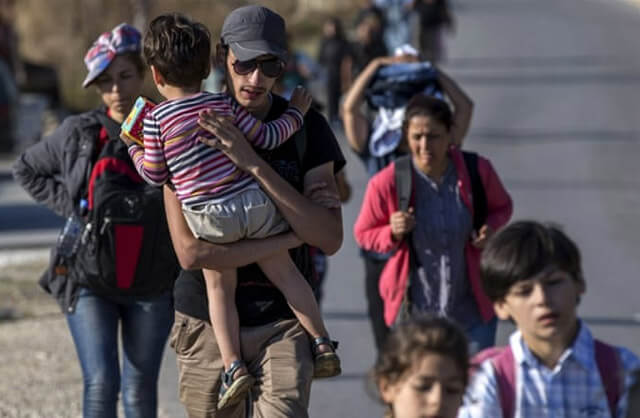The state is bound to protect the migrants

On 24 April 2015, in the vicinity of Veles, a train killed 14 migrant refugees, at least two of which were minors. On the 23 May, another minor was killed on the rails along Demir Kapija. In the past 10 months at least 28 foreigners were killed, including babies, women and children, fleeing their homelands in West Asia and Central Africa and transiting through the territory of the Republic of Macedonia. In case these people are discovered by the police, they get either deported to the Republic of Greece, or detained in the Shelter Center for Foreigners in Gazi Baba, where they are forced to spend several months is severely inhumane conditions.
Article 29 of the Constitution of the Republic of Macedonia stipulates that foreigners enjoy constitutionally guaranteed freedoms and rights, under conditions laid down by law and international agreements. The Republic of Macedonia, as a signatory of the European Convention on Human Rights, apart from the obligation to refrain from deprivation of lives, must also take the appropriate steps to protect the lives of individuals on its territory. This may particularly apply to situations when the state is aware of multiple risks which may lead to deprivation of human lives. The same obligation also refers to the prevention and protection against torture of all persons deprived from liberty.
In spite of the fact that MoI is familiar with the dangers and risks that migrants and refugees are exposed to, the state has not taken appropriate measures to protect their human rights. The rails are unsecured, there is no signalization or signs warning the people moving in the vicinity about the danger, and the migrant refugees are not even provided with the most elementary humanitarian aid. The only Shelter Center in Gazi Baba is overcrowded and already dilapidated; basic, but insufficient healthcare is only provided by the Red Cross of the Republic of Macedonia, and no legal aid is provided. The Shelter Center is completely closed to the civil associations and the media.
The detention procedure is unlawfully implemented. In accordance with article 108, paragraph 3 of the Law on Foreigners, MoI adopts a decision for temporary detention of a foreigner, while paragraph 5 stipulates that foreigners have the right to appeal first before the State Commission for Deciding in Administrative Procedures of the Second Instance, and then to the Administrative and Supreme Administrative Courts. In accordance with Article 19, paragraph 3 from the Law on Administrative Procedure, the participants in the procedure who are not citizens of the Republic of Macedonia and do not understand the Macedonian language and its Cyrillic alphabet, are entitled to an interpreter. Article 61, paragraph 5, stipulates that the bodies that the administrative procedure is conducted in front of, should respond in Macedonian and in the official language used by the party. The unlawfulness of the detention procedure consists of MoI not providing an interpreter, whereby the migrant refugees are not in a position to either understand or appeal against their detention.
In the course of May, MoI announced the Draft Law on Amending the Law on Asylum and Temporary Protection. What is newly introduced is the possibility for migrants to express their intention for submission of a request for recognition of the right to asylum to the police officers. Thereby, they will have the chance to submit the said request within 72 hours. In the timeframe between the expression of the intention and the submission of the request, they will not be considered illegal migrants and they will be given the right to temporary free movement and legal use of the means of public transport. This solution is expected to curb the number of illegal smugglers. Although this is a generally good proposal which is already functioning in the Republic of Serbia, it must be emphasized that the change in the Law itself would not imply urgent implementation of the solution. The draft stipulates that the Minister of Internal Affairs would first need to adopt a Rulebook to operationalize the solution. Although the Draft-Law is ready, it has still not reached assembly procedure.
The Helsinki Committee would like to point out that in case when the legal remedies from the Law on Foreigners and the Law on General Administrative Procedure are not effective, i.e. do not function, and in case when there is no other legal remedy, the migrants are left with the possibility to file direct lawsuit against the Republic of Macedonia to the European Court in Strasbourg. According to the practice of the European Court of Human Rights (e.g. case of Kalashnikov vs. Russia, Application no. 47095/99, Strasbourg, 15 July 2002, paragraphs 92-103), it is stipulated that in cases when the state does not aim to torture someone, overcrowding and poor conditions in closed institutions are equal to torture. Because of all of the listed reasons, we appeal to the Government to protect the constitutionally guaranteed rights of migrant refugees, to urgently adopt the Draft-Law and immediately send it to the Assembly, which needs to adopt it in an accelerated procedure and shorten the deadline for drafting the Rulebook to not more than 30 days as of the day the law comes into force.



